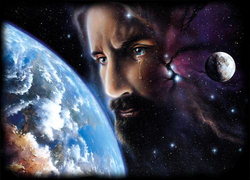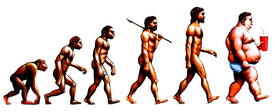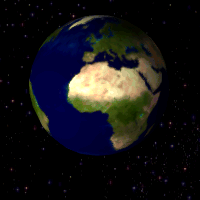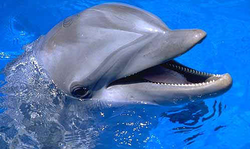Earth
“Earth? Actually a codename for the world! Mum's the word!”
– Julian Assange on Earth
“I hope it all fucking explodes!”
– Captain Odious on Earth
“Mostly harmless.”
– Aliens on Earth
“What on Earth?”
– What on Earth, on Earth
Earth (or The Earth as it is known by its self-absorbed inhabitants) is the third planet from the star Sol. The planet's most visible intelligent life, known simply as humans, believe that their small ball of rock is in fact the only planet in the entire universe that is inhabited. It is entirely understandable that they would leap to such a ridiculous conclusion considering that Earth's inhabitants have never journeyed anywhere else in the universe. What's more, they've even ignored the best vacation spots in their own star system. This is probably due to the fact that Earth's inhabitants are incredibly dull and spend most of their time either watching TV or killing each other. This has led the planet to be classified as Mostly Harmless.
Chronology
Formation and early history
The Earth was formed about five billion years ago from a giant ball of space dust and cosmological magic. The origin of this creation is often attributed to God by the human inhabitants, and rightly so. Most species throughout the universe are well aware of God's various experiments scattered around the cosmos, and Earth is probably the least famous of them. Nothing of particular interest to the galactic community happens there, and it is largely ignored. Some say God has resorted to ignoring Earth as well, but God fervently denies this assertion.
The actual process by which the Earth was created is often the subject of debate amongst the human scientists that inhabit the surface, but none of them are remotely correct. The human theory is usually that some sort of force known as gravity pulled all of the space dust and cosmological magic together. With increased density, heat began to be created and the Earth became a giant ball of flaming fire. After a period of surface cooling and bombardment from asteroids, volcanic activity released CO2 into the atmosphere to create air. Water, a very poisonous substance to normal life forms, began to accumulate on the surface. Little microorganisms began to evolve from the primordial goo, which eventually spawned all of the primitive life forms native to the Earth today. Or so the theory goes. The majority of scientists throughout the universe have no idea how the Earth was formed, mostly because they don't really care. God however asserted once during an interview that, "Man, I just like, said, 'let there be Earth,' or something, and boom, it was just there man. Awesome, huh?"
Evolution
There are remarkably few intelligent species of life that inhabit Earth, and only one is native. There are two known intelligent life forms that call Earth home, dolphins, and human beings, dolphins of course being the more intelligent of the two. It is a testament to human stupidity that they do not realize that another sentient and intelligent species lives among them, and has even attempted to communicate with them numerous times.
The evolution of life itself on the planet's surface is a tale of slow change. The primordial goo turned single cell life forms eventually became multicellular life forms. Somehow this occurred through random chance, or by an act of God, but both God and Random Chance have denied this both privately and publicly, so it's basically a mystery. Multicellular organisms began to crawl out of the poisonous water-filled oceans and inhabit the land. After much evolving, apes eventually became humans. A highly accurate scene of this occurrence can be found in the human film 2001: A Space Odyssey.
Future
The future of the planet is questionable. The humans seem intent upon destroying their planet by whatever means possible. If the humans are not successful in destroying their planet, the sun surely will be someday. The sun is due to expand to the point of enveloping the puny little planet. Many galactic powers would be willing to come to the rescue of the sentient life forms on Earth when this occurs if the Earthlings weren't so stuck up. They have failed to establish diplomatic relations with not only the most powerful civilizations in the galaxy, they even ignore their neighbors in the Alpha Proxima system. This is often viewed as pure bad manners, and civilizations will probably be happy to watch the Earthlings burn within their swollen sun.
There are plans for a new interstellar hyperspace bypass to be built through the orbital path of Earth. The plans are available at the regional galactic development office in the Alpha Centauri system if anyone has a desire to view them or file complaints.
Composition
Earth is round. Well, more pear shaped according to some. The Earth is composed mostly of the elements iron, oxygen, and silicon. Others contend that the major elemental components of Earth are earth, wind, and fire. The center of the earth is hot molten rock. The surface is much harder and solid and tends to not be able to make up its mind about where it wants to be. One might say that the Earth's surface is composed of many stubborn components jostling each other for the best position on the surface of the planet. Some of these so-called "plates" as they have been dubbed are not so lucky in the pole position. The smaller ones, such as the Juan de Fuca plate, are in the process of being trampled to death by much larger plates, such as the North American plate.
As has been stated before, Earth is covered about 70% in the toxic chemical Dihydrogen Monoxide, better known by its street name "Water". Any life form that plans on visiting this wayward little ball of rock should be extremely cautious as it is everywhere. It's even in the air. Only one species capable of interstellar travel has been able to figure out how to survive in Earth's moisture-drenched atmosphere: the Då'Ralänghen from the planet Hercolubus in the Andean Star System. Their adventures are chronicled in a popular Earth film, Signs, directed by M. Night Shyamalan, easily one of the three smartest humans alive. The film is terribly biased though and isn't worth the precious carbon film it's printed on. At any rate, unless you're prepared to deal with a ton of toxic water, stay away from Earth. Seriously. However, when diluted with the compound that is vital to most known life forms, known as alcohol, it may even become ingestible (depending on the ratio of water to alcohol of course).
The atmosphere is composed of mainly nitrogen, oxygen, and water vapor, thus making the air there extremely toxic as well. Only those species especially adapted to handle this should venture to the surface.
Orbit and rotation
As with all planets, Earth rotates at regular intervals, creating the local phenomenon known as night and day. Night is generally viewed as the portion of time within the regular interval of one rotation in which the planets star, the sun, is hidden by the rest of the planet. Day is the opposite: the sun shines brightly and provides light to all, free of charge no less. In humanity's early history, the interaction between the people and the sun was often quite hilarious. Every time night came around, humanity would erupt into mass panic and would commence killing anything of particular value nearby in hopes of appeasing the sun so it would rise again. Little did they know that the day would have come anyway due to the rotation of the planet, and indeed the more intelligent species of the planet knew this, but they remained silent as it was just too entertaining to see the humans burn their food supplies, slaughter their most beautiful females, and throw their valuable resources down deep, dark holes. This of course was meant to convince the inanimate ball of burning gas in the sky to rise again the next day, even though relative to the planet the sun remains stationary. The humans never even tried skipping a day of sacrifices. You'd think that they would at least try it once just to see what would happen and save themselves a whole lot of trouble. Then again, most people who suggested this were usually sacrificed themselves.
At any rate, this phenomenon also creates the seasons experienced on Earth. Earth's orbit around the sun also contributes to its aging process. Each new orbit is considered one local year, which in universal terms of time is simply a standard galactic week. As you can imagine, the Earthlings don't get much done within this massive waste of time.
Inhabitants
Intelligent species
As we have said earlier, there are two sentient "intelligent" species that inhabit the Earth. The humans are of course the only native intelligent species and are better classified as "semi-intelligent", but the most intelligent species currently residing on Earth are the Cetaceans of the planet Cetaceia, better known as dolphins to humans. Cetaceia of course was the victim of an intergalactic terrorist attack nearly 10 million years ago and Earth became the appointed home of the Cetaceans. The Cetaceans have been secretly harvesting a bounty of fish for themselves, for both eating and for secret intergalactic trade, as after all, the juices squeezed out of fish (and other such creatures throughout the cosmos) are an incredibly valuable and important intergalactic commodity. The Cetaceans have tried on numerous occasions to communicate with humanity, but have not been successful as the humans are too stupid to understand the language of Cetaceia.
Semi-Intelligent species
This comes highly recommended if you want a good laugh. Basically, the apes turned humans began to socialize with one another in greater numbers. Little cavemen societies began to spring up. Two competing factions known as the Neanderthals and the Cromagnons began to fight over who would become the dominant species on the planet. Both of these factions were destroyed by the dark horse newcomer Homo Erectus who eventually became the Homo Sapiens, or humans, of today. The first human of course was Adam. From there everything just went downhill.
God was visiting Adam and his girlfriend, Eve, one day and found out they had stolen and eaten some of the fruit he was intending to have with his lunch that day. God was really pissed off, declared his experiment of Earth a failure, and banished the two humans from Eden. After years of procreation, the humans pissed off God again and were wiped out by the largest levels of toxic water the Earth had ever experienced. Human history at this point is basically a cycle of the humans pissing off God and being destroyed over and over again.
Around 15,563 GY (Galactic Years), or 3000 B.C. local time, the Egyptians rose to prominence. Of course they had help from the Shrä'aglan Empire, who journeyed to the Sol System around this time in search of the famous intergalactic titty-bar, Hâlí'aqbad Reløugĕ, which unfortunately is not in the Sol System (if you're ever in the Epsilon Aurigae system, it's on the 4th moon of the planet Hâlí-Yør). The Shrä'aglan took pity on the Egyptians and built them a few pyramids to help them out before they continued on their quest.
Years and years of bloodshed led up to the point that they're at today, which isn't much different other than their change in clothes and use of rudimentary technologies. Humans are generally fat, complacent, and oblivious to the universe around them. They can't even agree on a unified government for themselves, as they have separate political entities within their own species scattered across the planet.
Others
The dumber species of Earth are collectively known as flora and fauna, or plants and animals. There are plenty of them, but the humans are engaging in an aggressive campaign to get rid of most of these, especially the really neat looking ones many tourists would want to see if they traveled to Earth.
Moon
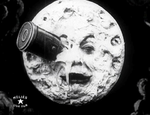
The Earth has a single natural satellite. Their moon is once again very self-absorbingly referred to as The Moon as if it is the only one out there. Humans at least know that other moons exist in the universe. In fact, the planet Saturn, the 7th from the star Sol, is currently leading the Sol System race for most moons, and has done so for many millions of years. Most casual observers and those scientists who've paid enough attention to the Sol system just refer to Earth's moon as Luna, or more correctly Earth I. Recent attempts at celestial comedy have brought some attention to the Earth system. Some marginal empires throughout the neighborhood have tried to create another satellite in the Earth system in order to confuse the human population of Earth. These attempts have largely been unsuccessful, but have proven to be rather funny at any rate.
Humans have at least journeyed to their own moon, but granted, they've only done so a few times. They're blissfully unaware of the great riches buried at the center of their moon, and most assuredly, they would be more keen on exploring it if they knew about it, those greedy little bastards.
See also


